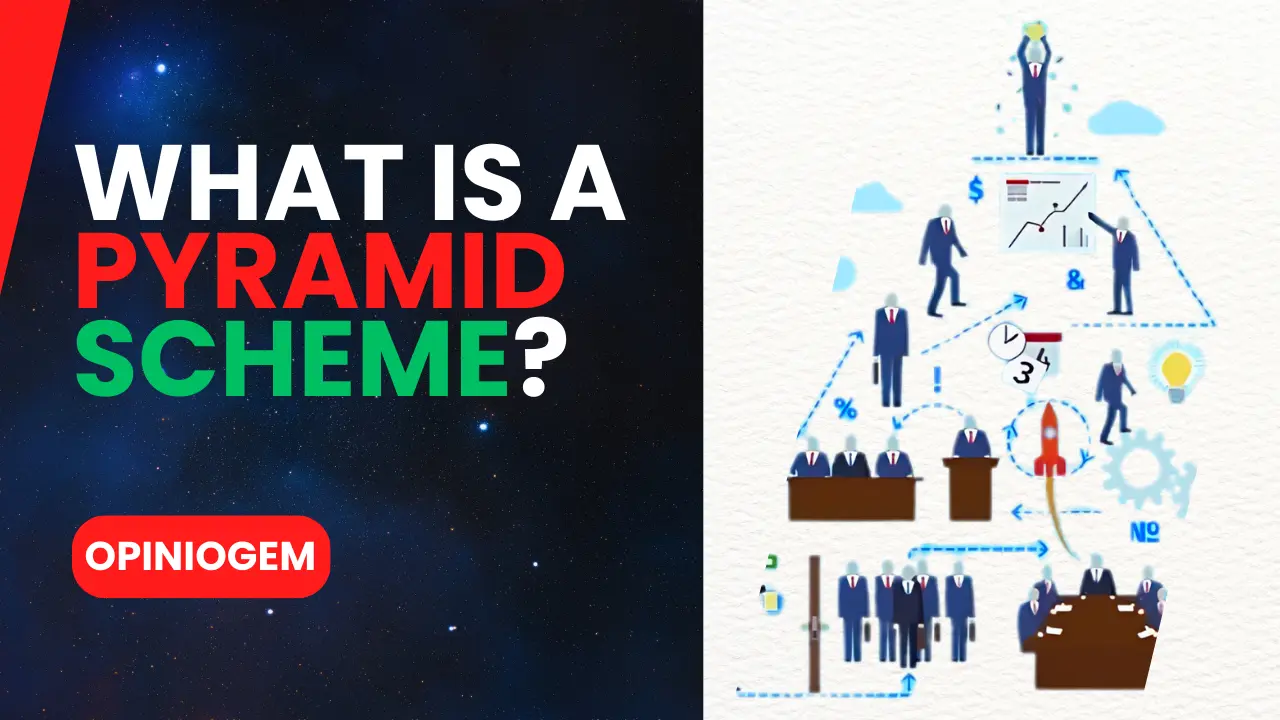A pyramid scheme is a scam that looks like a real business and promises big returns. It is similar to Ponzi schemes and multi-level marketing (MLM) companies but has unique features. This article explains how pyramid schemes work, how to spot them, and how they differ from MLMs and Ponzi schemes.
What is a Pyramid Scheme?
A pyramid scheme is a fraudulent business model that generates income by recruiting new members instead of selling legitimate products or services. These schemes often appear as real companies offering products or services.
However, their primary focus is on expanding the number of participants. To give the illusion of a structured business, participants are labeled as investors, salespeople, agents, or distributors.

How Do Pyramid Schemes Work?
- It starts with a few people recruiting others to join, asking them to invest money, pay membership fees, or buy products.
- Founders make money from membership fees, commissions, and product sales from new recruits.
- The scheme grows as each person recruits more members, creating a pyramid where profits go up to the top.
- A few top-tier participants make a lot of money from the fees and commissions of those below them.
Pyramid Schemes vs. MLMs
Pyramid schemes and MLMs have some similarities, but there are key differences between a legitimate MLM and an illegal pyramid scheme
- Participants earn money by recruiting new members.
- Participants are independent contractors without a regular salary.
- Membership fees and personal sales are common.
| Aspect | Pyramid Scheme | MLM |
|---|---|---|
| Initial Investment | ✅ | ❌ |
| Buyback of Unsold Inventory | ❌ | ✅ |
| Focus on Product Marketing | ❌ | ✅ |
| Emphasis on Recruiting | ✅ | ❌ |
| Higher Commissions for Recruiting | ✅ | ❌ |
Pyramid Schemes vs. Ponzi Schemes
Ponzi schemes, like Bernie Madoff’s scam, share traits with pyramid schemes but operate differently.
- Investment: Ponzi schemes need a single investment with a promise of high returns later.
- Recruitment: Ponzi schemes don’t require recruiting new participants.
- Income Source: Pyramid scheme participants know their income comes from new recruits, while Ponzi scheme victims don’t realize their returns come from newer investors.

Types of Pyramid Schemes
Pyramid schemes come in different forms, making them hard to spot. Here are some common types:
Chain Email
- Participants send money to the first person on a list, remove their name, add their own, and forward the email.
- This modern version of chain mail is an illegal pyramid scheme.
Investment Clubs
- Legitimate vs. Fraudulent: Some investment clubs are real, but others focus more on recruitment than actual investments.
- They lure participants with quick returns and encourage them to start their own clubs and recruit others.
BurnLounge Inc.
- Founded in 2004, BurnLounge Inc. charged subscription fees and paid participants points and bonuses for recruiting new members.
- The FTC shut it down and returned nearly $1.9 million to affected consumers.
Fortune Hi-Tech Marketing
- Business Model: Agents sold products from legitimate companies but earned more from recruiting others.
- Legal Action: The FTC settled a lawsuit and returned over $5.5 million to nearly 400,000 scammed individuals.

How to Identify a Pyramid Scheme
- Recruitment Focus: Programs that emphasize recruitment over product sales are likely pyramid schemes.
- Lack of Genuine Products: If the business offers hard-to-value products or services, be cautious.
- High Return Promises: Quick, easy money often means commissions from new recruits rather than product sales.
- Passive Income Claims: Be wary of offers involving minimal work for high returns.
- Lack of Retail Sales Revenue: Legitimate businesses generate revenue from product sales, not just from recruiting.
- Complex Commission Structures: If commissions are hard to understand or mainly based on recruiting, be careful.
Red Flags
- Quick returns are a common lure.
- More emphasis on recruiting than selling products.
- Lack of a genuine product or service.
- Claims of earning money with little effort.
Conclusion
Pyramid schemes eventually collapse, causing most participants to lose their money. To avoid falling victim, remember these key points:
- If there’s no real product or service, it’s likely a pyramid scheme.
- If recruitment is the main focus, be wary.
- Be skeptical of promises of quick, high returns.
Fraudsters often use social media, internet ads, and other means to disguise pyramid schemes as real businesses. Always exercise caution and thoroughly research any opportunity before investing.
If you want to Prevent yourself from a Pyramid Scheme, Click on it.



[…] signs. It’s important to know how these schemes work and what can go wrong. Our complete guide on What is a Pyramid Scheme gives you helpful […]